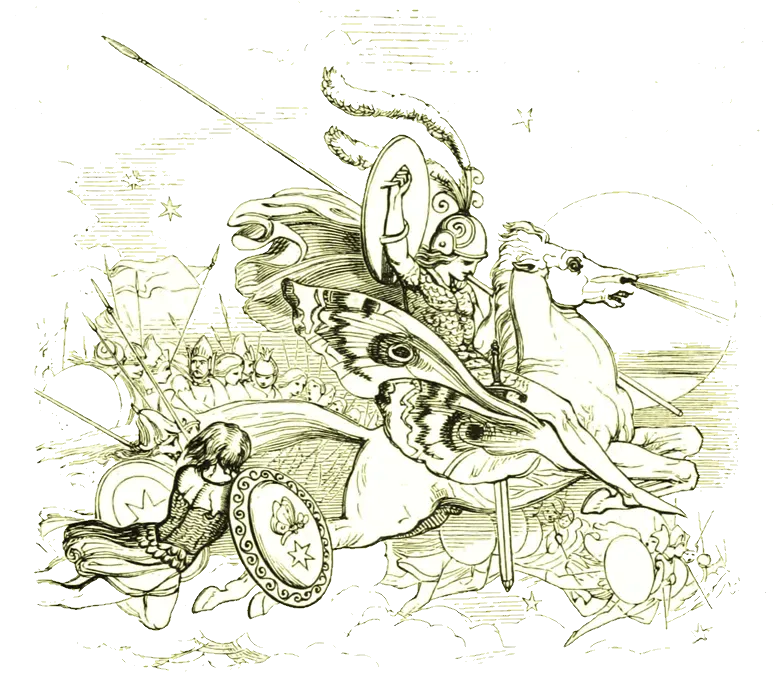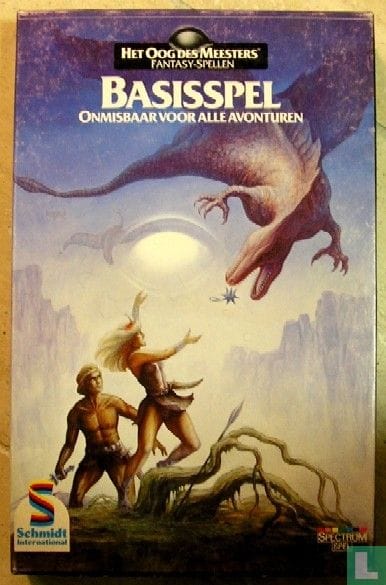
I've just been reading an interesting post on the Throne of Salt blog, where the author writes about Alternate D&D Frameworks. It's basically about what one could extract from two basic facts of D&D rules (clerics turn undead, wizards have charm person), as a thought experiment for your campaign background.
It's a good read, and incidentally I've been playing with a similar concept: Given the The Dark Eye 1E spell lists, what could this say about the world?
Short Background
The Dark Eye (or "Das Schwarze Auge" in German) was my first roleplaying game. I bought it at the library of my local Catholic church, which was in the same building as the Kindergarten I visited. No Satanic Panic here…
This was the mid-80s. The Dark Eye didn't get a proper setting expansion until its 2nd edition in 1989, and I don't think I got the Advanced box set of the first edition, where at least a few facts where documented, before that. So for a while, I could just rely on what little I could find in the one or two adventures I had. Now, I didn't actually get to play that much in that time period, but I was a very day-dreamy kid, and it's that quality that I'd like to resurrect for the purposes of this article. We're intentionally ignoring anything that came from later editions, magazines or other primary sources beyond the core game!

TDE1 was influenced by D&D, Tunnels & Trolls and RuneQuest. So it had race-as-class elves as well as wizards, the only two spellcasters of the basic box. Both had their own short spell lists, but the wizard was able to cast from both (elves had the better weapon selection to make up for it).
Just the Spell Lists, Ma'am
The first list was presented as the "magic formulas of the elves", not just "basic spells" or something similar, and in rough D&D equivalents you got:
- Cure Wounds – basic healing
- Light – equivalent of a torch, remote controlled up to 10 meters
- Knock – open any lock
- Magic Armor – stacks with regular armor, equivalent of chainmail
- Invisibility – not usable in combat by fiat alone, can be extended to others
- Thunderbolt – basic magic attack, bypasses armor
- Charm Person – makes someone your friend, countercheck possible, but if failed it's permanent
Nothing really special about it, most of that was well-known from D&D or Tunnels & Trolls.
Now, wizards had some exclusive spells of their own on top of this:
- Magic Lock – Locks a door, mechanically rather weird. Bypassed by sheer luck or a "counterspell", which probably refers to the aformentioned Knock
- Hold Person – Paralyze one or more enemies.
- Fear – Scare single enemy.
- Enrage – Turns "friend" into a berserker
- Sense Emotions – Discovers basic facts of another person, good for predicting random encounters if not totally obvious…
- Polymorph Other – Your basic "turn enemy into newt" spell. Very expensive.
There's no big theme to this, either, although one might say it turns slightly darker.
What does this say about: Elves
Roughly categorized, we've got Support (Cure Wounds, Light), Subterfuge (Knock, Invisibility, Charm Person) and Combat (Magic Armor, Thunderbolt).
Every elf can cast / is taught all of these spells.
For my worldbuilding exercise, I'm focusing on the subterfuge part, as that seems the most extravagant, the rest being "just" about self-preservation and combat superiority. Those should come into play, too, but won't form the core of what makes an elf.
As the Throne of Salt article pointed out, what do you make out of a populace where everyone can convince everyone else that they're your best friend? There they're close to assuming that this would put too much power into the hand of every sociopath with a magic stick, and in later editions of TDE it's almost like an elven "handshake" – they're going in with the best intentions and this just makes sure that they're reciprocal.
I thought a bit about making the elves annoying fairy lords with a superiority complex, but that's a bit too stereotypical. Instead I'm going to say that in this alternative "World of the Master", elves are Alien Explorers!
From this point of view, every spell can serve to make their wanderings easier and help them with almost everything they encounter. They can enter any place (Knock), even underground and at night (Light) and hopefully have peaceful contact with whoever they encounter, even if they don't speak their language (Charm Person). If that fails, they can try to fight (Thunderbolt, Magic Armor) or retreat and recover (Cure Wounds, Invisibility).
This doesn't contradict the information in the book, where their ancestors are described as "children of the sun and mist" – doesn't that sound like people stepping through transdimensional portals, and just like the Terminator, unable to bring material goods with them?
Now let's just ditch that this was about the ancestors and in the mean time you've got your elven "colonies" living in the here and now. Those might exist, but the people there are probably closer to pointy-eared humans. The adventuring type are Newly Arrived in This World. Their memory might be scrambled up or almost empty, but their curiosity reigns.
What does this say about: Wizards
We know that the basic spells were from elves, but now also have the information that they're not from around here. So where and when did the wizards get those spells? Given that the new spells aren't exactly peace to the world, let's go with something dark:
A long while ago, the first wanderers came through the Walls of Mist separating dimensions. They made lots of friends, but there were also some humans who resisted that spell, and had only distrust for those newcomers. For the elves, this might just be basic exploration procedure, but for the humans who kinda-sorta get along without spell-born diplomacy, this was intrusive.
And as humans do, some of them got together and grabbed a few of the elven explorers. What they did to get their information is best left to the sands of time, but in the end they got all the spells the elves had. And also a lot of paranoia: Won't the elves find out and strike back? And if these were the mostly peaceful explorers, what other kinds of elves could be sent from the void to seek revenge?
Thus the wizardly tradition has to cope with two facts: All you have is stolen and Someone might get you.
The first is expressed in the formula they added: Everything is based on elven spells, after a lot of trial and error. There's no sound theoretical basis to help here, the "academies" aren't equal to modern universities.
- Magic Lock is just an inverse Knock. Easy to develop, and helps against mundane foes but any elf can easily circumvent it.
- Hold Person is an amplified and weaponized Magic Armor. That's why the victims are impervious to attacks, they're just held in force field sheaths.
- Fear is Charm Person filtered through paranoid human minds.
- Enrage and Sense Emotions are also based on Charm Person, and speak volumes about how wizards see other people
- Polymorph Other is the work of a great genius, who could turn Cure Wounds into such a malevolent work of arcane art.
Some other background facts we have in the core booklet about wizards fit into this scheme: They all have tattoos on their left hand – of course they do, we all know that elves can't be tattooed and thus they can't infiltrate magical societies. They all have magical staffs which can be imbued with special magics. Yes, adding magic to material items proved to be more versatile than spellcasting, if rarely so powerful. There's a much wider variety of magical abilities, but they invariably burn out, there's almost no permanent magical item (NB: almost all the items in the core book are one-use).
And of course wizards can enter the academy to pay for more magical energy. This comes from the fact that no human is born with a special gift here, the magical societies have rituals to add that to their acolytes, and derived from this technique are ways to extend this, even if they're almost prohibitively expensive (NB: on each level-up, elves and wizards roll 1d6 and add that to either their life or magic points, but wizards can also spend a lot of gold to add a few points on top).
The bad thing about paranoia is that you tend to hide every piece of knowledge, so after a few hundred years, almost nobody knows about the elven roots of their ill-gained magical abilities. Yet the fear remains, and wizards often isolate themselves in remote towers…
Ta-da, magic!
This seems like a fun approach for worldbuilding. You could take any game's spell list and turn it into this. If you've got a rather large one, you could randomly determine the "common" ones and proceed from that.
It's a fun exercise, contact me if you come up with anything fun!